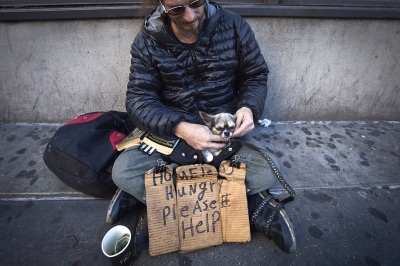More cities say, 'Don't feed the homeless'

LAS VEGAS (Christian Examiner) – What started in Las Vegas didn't stay in Vegas.
The criminalization of efforts to feed people in need has spread since the July 2006 Las Vegas City Council's ordinance that made it illegal to offer so much as a biscuit to a poor person in a city park. It took seven years to catch on, but since 2013 at least 21 more cities have enacted laws related to the public feeding of people, and at least 10 more are in the "consideration" process.
"The Las Vegas ordinance is believed to be the first to explicitly make it an offense to feed 'the indigent,'" according to a July 28, 2006, article in the New York Times.
Fort Lauderdale, Fla., is the latest city to join the movement. Its 2014 ordinance stipulates that when handing out food to the public—specifically, the homeless—the activity must be at least 500 feet from homes, only one feeding unit can be present in any given city block, and all sites must be at least 500 feet from each other.
Other related Fort Lauderdale laws passed just this year included panhandling at major intersections, sleeping on public property and storing personal belongings on public property, according to reports in the local daily newspaper, the Sun Sentinel.
"In recent years, cities across the nation have established a precedent of criminalizing homelessness and pushing the problem out of sight," according to a document released Oct. 24 by the National Coalition for the Homeless. "One method that has become more popular has been to introduce new legislation, designed with the intention of restricting individuals and groups from sharing food with people experiencing homelessness."
Columbia, S.C. and Raleigh, N.C. are some of the more prominent cities that regulate food distribution to the homeless, but cities in Oklahoma, Texas and California have done so as well.
The ordinances typically fall into three categories: restrictions on the use of public property; regulations regarding food safety issues; and, limits on giving the homeless food in a specific area—with the result of moving the homeless out of that area.
"In most cases, businesses and homeowners who do not want people experiencing homelessness to be attracted to their communities, place tremendous pressure, and sometimes even harass, the organization responsible for the food-sharing program to cease or relocate their programs," according to the coalition's document.
Churches and church-based ministries are among the most usual purveyors of food for the homeless.
"It's going to cause confusion and hardship on the homeless," said Ray Sternbe in an article written by Lindsay Ellis that appeared in the Christian Science Monitor. Sternberg works with homeless people at First Baptist Church of Fort Lauderdale. "I think though that the ministries that are doing that [feeding the homeless] on a consistent basis, will find a way to help."
Love Wins in Raleigh, N.C., is a ministry supported by several area churches. For six years they provided Saturday morning breakfast to all who stopped by Moore Square, a downtown park. But police stopped by Aug. 24, 2013, to say volunteers would be arrested if they gave out the sausage biscuits and coffee to the 70 people already in line.
A national uproar over "biscuitgate" caused the city to renovate a warehouse as a temporary food distribution center—although it still plans to sell the property to a developer in the next three to five years.
Bill Golderer, convening minister at Broad Street Ministries in Philadelphia, said in a 2012 report on NPR Radio that he doesn't exactly support the ban on outdoor meals for the homeless, but he does think the hungry deserve better than they're getting now.
"Maybe this is the time to look at a new approach," Golderer told NPR. "Maybe we haven't done everything we can. Maybe we haven't looked at every opportunity to serve people better."
Against this negative trend for the homeless, some cities have reversed course.
Philadelphia and Houston have rolled back enforcement of city ordinances related to feeding the hungry, in some instances because of legal challenges; in others, because of local opposition (some bolstered by national attention).
Objections to feeding ministries consist for the most part of complaints about: public safety; litter; rodents; food safety; personal hygiene, and the like. Others argue providing meals is a Band-aid approach with temporary effects at best.
Objections to regulations include concerns they: violate the First Amendment—Freedom of Religion, of Expression, of Assembly; don't consider the needs of the homeless who fear going into a building; and, stand contrary to God's law, which says to "feed the hungry."
Irene Smith is a volunteer with Love thy Neighbor, a Fort Lauderdale ministry that provides weekly meals on the beach and a city park. The feedings give volunteers an opportunity to network with the homeless and perhaps encourage them to a more stable lifestyle, she said.
"The feedings are just considered an eyesore to you guys. We see these meals as a starting point," Smith said in a Sun-Sentinel article.
"Feeding people on the streets is sanctioning homelessness," countered Ron Book, a city lobbyist and chairman of the Miami-Dade County Homeless Trust. "Whatever discourages feeding people on the streets is a positive thing."
The U.S. government, through its Housing and Urban Development office, has also looked at the situation.
"Criminalization is not the answer to meeting the needs of cities that are concerned about homelessness," said Ann Marie Oliva, acting director of HUD's Office of Special Needs Assistance Programs, in an Oct. 6, 2014 memo. "There are sensible, cost-effective, and humane solutions to homelessness, which a number of cities have pursued.
"We all know that the solution to street and unsheltered homelessness is to achieve the goals of Opening Doors," Oliva continued, "by providing permanent housing for people sleeping on the streets, not criminalizing their very existence."